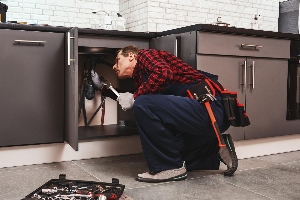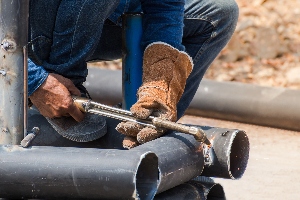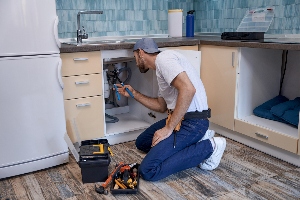Clogged drains are a common household issue that can lead to inconvenience and the need for costly repairs if not addressed promptly. Understanding the primary causes of these blockages is essential for maintaining a smoothly running plumbing system. Everyday activities, from washing dishes to showering, can contribute to drain clogs. It's important to be aware of what goes down your drains and how it might affect them.
One significant contributor to drain blockages is the build-up of grease, oil, and fat in the pipes. These substances, often a byproduct of cooking, can solidify within the plumbing, creating stubborn blockages that disrupt water flow. Another prevalent cause is the accumulation of hair and soap residue, particularly in bathroom drains, which can entangle and slowly obstruct the pipes.
Food waste, such as eggshells and coffee grounds, should also be disposed of properly, rather than being washed down the kitchen sink. These materials can stick to the pipes and gradually accumulate, leading to a clog. By staying informed and attentive to what enters your drains, you can prevent many common blockages and maintain the integrity of your plumbing infrastructure.
Hair Build-Up
When considering the health of your drains, it’s crucial to recognize the impact of hair build-up. Over time, as you shower or wash your hair in the sink, loose strands inevitably flow into the drainage system. While a few hairs may not seem like a problem, their cumulative effect can be substantial.
Why Hair Causes Clogs:
Hair is resistant to breakdown and can entangle with other materials in your pipes, such as:
- Soap scum
- Shampoo residue
- Household debris
This accumulating mass becomes a net-like obstruction which traps more hair and debris over time.
Prevention Tips:
- Use Drain Screens: Fit screens over bathroom drains to intercept hair before it enters the piping system.
- Brush Hair Before Showering: Reduce loose hairs by brushing them out beforehand.
- Regular Maintenance: Weekly, flush the drain with hot water to minimize build-up.
If Clogs Occur:
- Plunge Gently: Use a plunger specifically designed for sinks and showers to dislodge minor hair blockages.
- Natural Cleaners: Pour a mixture of baking soda and vinegar down the drain, wait for several minutes, then flush with hot water to dissolve minor build-ups.
By being proactive with these maintenance steps, you drastically reduce the risk of hair-induced clogs, preserving the integrity and flow of your home’s drainage system.
Soap Scum Accumulation
Soap scum is a common culprit in clogged drain issues. When you shower or bathe, natural oils from your skin combine with soap, creating a filmy residue known as soap scum. Over time, this substance adheres to the sides of pipes, reducing the diameter through which water can flow.
Here's what you need to know about soap scum:
- Composition: Soap scum is primarily composed of minerals from water and fatty acids from soap. This combination often includes calcium or magnesium, which gives it a hard and sticky quality.
- Locations Affected: It predominantly accumulates in bathroom drains, such as sinks, bathtubs, and showers, but it can also build up in kitchen sinks and laundry drain lines.
To mitigate the buildup, consider these strategies:
- Regular Cleaning: Use a non-abrasive cleaning agent specially formulated to break down soap scum without damaging your pipes.
- Preventive Maintenance:
some text- Hot Water Flushes: Periodically flush drains with boiling water to dissolve soap particles before they harden.
- Baking Soda and Vinegar: This natural combination can help in breaking down scum without harsh chemicals.
- Physical Barriers:
some text- Install drain strainers or catchers to prevent particles that contribute to scum building up from entering your plumbing system.
By being vigilant and following these practices, you can prevent soap scum from becoming a draining issue in your home.
Foreign Object Blockages
Foreign objects are another major factor in drain blockages. Items that are not intended for sewer systems, such as sanitary products, wipes, cotton swabs, and even small toys, can cause significant plumbing issues. These objects do not break down in water and can easily accumulate within the pipes.
Here's what you need to know about foreign object blockages:
- Composition: Unlike organic waste, these objects are typically made of non-biodegradable materials like plastic and cotton, which can persist in the plumbing system without breaking down.
- Locations Affected: These blockages commonly occur in toilet and bathroom drains but can also happen in any drain that mistakenly has foreign objects introduced into it, including kitchen sinks and utility basins.
To mitigate the buildup, consider these strategies:
- Regular Checks: Periodically inspect areas around drains to ensure no inappropriate items could accidentally fall in.
Preventive Maintenance:
- Drain Covers: Use mesh covers over drains to catch large particles and objects before they enter your plumbing.
- Public Awareness: Educate household members about what should not be flushed or washed down the drain.
- Waste Bins: Provide accessible bins in bathrooms and kitchens for proper disposal of items that could potentially clog drains.
By implementing these precautions, you can significantly reduce the risk of blockages caused by foreign objects and maintain a healthier, more efficient plumbing system in your home.
Using One Call Plumbing for Drain Cleaning in Greenville
When faced with stubborn clogs or recurring drainage issues, professional intervention is often the most effective solution. In Greenville, One Call Plumbing offers expert drain cleaning services that can restore your plumbing system's optimal function swiftly and efficiently. The team of skilled technicians uses the latest tools and techniques to tackle even the toughest blockages, ensuring your drains are free of obstructions and running smoothly.
Regular maintenance and careful monitoring of what goes down your drains are essential practices to prevent clogs. One Call Plumbing provides reliable, thorough drain cleaning services in Greenville, helping you avoid the hassle and expense of major plumbing issues. Trust their expertise to keep your home's plumbing system in top condition, ensuring peace and comfort for you and your family.












